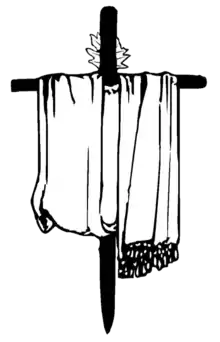Pandama
The pandama (Classical Mandaic: ࡐࡀࡍࡃࡀࡌࡀ) is a mouth-veil worn by Mandaean men during baptismal ceremonial rituals. It is the lower end of a cloth wrapped around the mouth and lower face to protect from water during immersion. The upper end of the cloth is used as a turban (burzinqa).[1]
%252C_Maysan%252C_Iraq_-_Mar_17%252C_2019_02.jpg.webp) Left: A Mandaean wearing a burzinqa (turban) and pandama (cloth covering the mouth) with a margna (staff), at a 2019 Parwanaya festival in Maysan Governorate, Iraq | |
| Type | mouth-veil |
|---|---|
| Material | cloth |
| Place of origin | southern Iraq and southwestern Iran |
In the Qolasta
Several prayers in the Qolasta are recited when putting on and loosening the pandama, including prayers 7 and 55.[2]
See also
- Mandaean priest § Clothing
- Litham, a similar veil covering the lower face worn by Tuareg men
- Alasho, a similar turban veil worn by Hausa men
References
- Buckley, Jorunn Jacobsen (2002). The Mandaeans: ancient texts and modern people (PDF). New York: Oxford University Press. ISBN 0-19-515385-5. OCLC 65198443.
- Drower, E. S. (1959). Canonical Prayerbook of the Mandaeans. Leiden: E.J. Brill.
This article is issued from Wikipedia. The text is licensed under Creative Commons - Attribution - Sharealike. Additional terms may apply for the media files.
